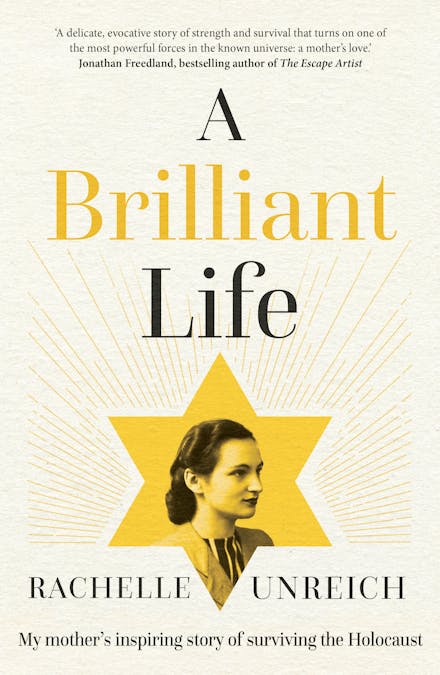 Reviewed by Magdalena Ball
Reviewed by Magdalena Ball
A Brilliant Life
My Mother’s Inspiring Story of Surviving the Holocaust
By Rachelle Unreich
Hachette
Nov 2023, ISBN: 9780733650178, rep $34.99, Paperback
Rachelle Unreich’s mother Mira was fifteen when her sister was deported to a concentration camp in occupied Poland. Mira never saw her again. Several years later, her father Dolphie was shot dead by Nazis in front of her before she was taken, with her mother and brothers, to a series of concentration camps: Plaszow, Auschwitz II-Birkenau, Ravensbruck, and Neustadt-Glewe. At Plaszow, Mira was separated from her mother Genia, who was taken to a death camp and murdered. Unreich has been a journalist for over 37 years and when her mother became seriously ill with cancer, she decided to turn her skills to her mother’s story, initially as a way of distracting her mother from her illness. The resulting story, A Brilliant Life, is a richly detailed account of Mira’s life before, during and after World War Two. It’s a harrowing and powerful story that sees Mira on the brink of death many times:
Her body was giving out. Pus-filled abscesses formed on her gums, and her teeth grew loose, wobbling when she touched them. She could no longer eat hard food, and was unable to eat on her own. She would simply lie on the floor of the barrack, when there was not even a bunk bed for some relief. (165)
Rachelle tells her mother’s story with a combination of tenderness and immediacy. Though Mira sees the worst of what human beings are capable of, she often talks about her luck, and the inherent goodness of people. Even at her bleakest moments, Mira never stops being a beacon of hope for those around her:
…she had been in the camps for close to eight months, and she could not see a way out. But she had sufficient faith in the dream, and enough trust in her mother, to make a vow to herself. Her birthday was only four days away. She did not have much energy left, but her mother’s visit had given her some koach, some strength. She could hang on until then. (167)
The story is deeply engaging, with Rachelle’s own experiences woven into the narrative through her mother’s story in a way that feels natural and seamless, inviting the reader to participate in the discovery process. The way in Rachelle’s modern-day experiences are connected to Mira’s conflates the past and present so that the particular circumstances of Mira’s life becomes a broader story of what it means to be a human, whether that be through the terrible adversary of a living in a concentration camp, or the tender ministrations of a mother for her family. There are many stories in A Brilliant Life, including the mystical connection between mother and daughter that runs like a twisted thread of DNA through the maternal line:
Through the veil of her sickness, past the nausea and her swollen belly and her ashiness, we were sharing moments of such beauty, I would feel dazzled by them afterwards. It was as if we had somehow managed to sneak off and have a mother—daughter holiday, one where we had spent the days laughing and crying and, most of all, loving each other fiercely. (204)
The second part of the book, which follows a central segment of glossy and colourful photos, focuses on Mira’s post-war marriage, her experiences as a young woman in the Paris of the fifties, her move to Melbourne in the sixties, motherhood, and family. The book is full of serendipity, connections, and mystical happenings, like objects that move at the right moment, treasures that wend their way through history to their rightful owner, and wonderful ghosts that appear just in time. This spirituality doesn’t come across as odd in the context of the book, instead it feels nourishing, like Mira’s unrelenting positivity and message that there is hope no matter how bad things get. What Mira went through was nothing short of tragic. She lost both parents, siblings, and suffered terribly in four concentration camps. It was so deeply engaging that I had to stop reading from time to time to have a cry. But A Brilliant Life is not a sad story. It’s a joyous story of love, forgiveness, and of how to end the cycle of trauma. It’s a book for our times, and one that leaves you oddly hopeful that somehow we will find a way forward into a place of healing and peace. What could be more relevant or necessary?